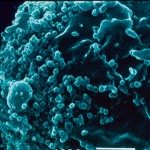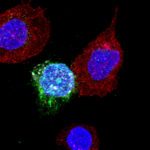Lien vers Pubmed [PMID] – 23772626
Immunol. Rev. 2013 Jul;254(1):281-94
Less than 0.5% of human immunodeficiency virus-1 (HIV-1)-infected patients maintain viral load below the threshold of detection by conventional assays for many years without antiretroviral therapy. These patients are known as HIV controllers (HICs) and offer a unique opportunity to explore and unravel efficient mechanisms of defense against HIV. An intense research effort has led to identifying viral and host factors that contribute to the control of viral replication. Although the host factors appear to be the primary determinants for HIV control, different genomic, transcriptomic, and immunological profiles have been described in HICs. This supports the existence of different mechanisms of control. We review here the most significant data in the field, including our own work, in the light of a crucial question: whether the ability to achieve and maintain the control of HIV replication is linked to genetic or immunological features specific to HIC or can be induced by vaccine or therapeutic approaches in the general population.



